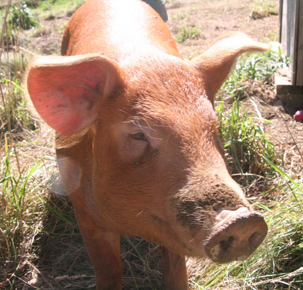
I am in the process, along with my husband, some friends and a team of restaurant professionals and farmers, of creating a real food restaurant in my town. I hired a farmer to help me source the food for this restaurant, and he was at the same time trying to help another restaurant source their food the same way, and reported on the scarcity of truly pastured food. I therefore went out and bought our own farm, hired that same farmer to manage the farm, as well as an assistant farm manager, and we are planning to raise animals there to supply the restaurant with grass fed proteins.
I’ve been posting adorable pictures of my new tenants, our pasture based broiler chickens and pastured pigs (see picture). I show these pictures with extreme enthusiasm to my friends, and the first question is always,“HOW CAN YOU EAT THOSE ADORABLE CREATURES?” I understand that question as I used to think the same way. However, I am not a vegetarian, and I want to share the experience I had that made me think differently about this question.
Let me preface this experience by saying that I used to be a vegetarian. Despite choosing my food carefully, I would get sick from time to time and I just never had the energy that I needed to take care of four kids. I assumed I was a tired mom and didn’t relate my low energy to my food intake. I thought that if I ate animals, I was contributing to their suffering. It felt like I was eating the pain and fear they went through when they were killed.
However, when my son Charlie became sick and I discovered the Weston Price Foundation, I slowly came to accept eating animals and became an omnivore again. After many years of eating meat myself, though, I never thought that I could be a part of killing an animal…or worse…killing an animal that I had raised.
Last year, I was asked to show the movie Farmageddon at the Mother Earth News Conference. During the screening, I was stationed in the back, selling Farm to Consumer Legal Defense Fund t-shirts and signing Farmageddon DVDs. In the room, a standing room only crowd of 750 people were learning from a live demonstration how to process chickens from farm to supermarket -ready from Joel Salatin.
This crowd wanted to learn how to slaughter and then process chickens humanely. Joel explained that it takes about six minutes to process each chicken. Then, in a stunning display, he showed the audience how he does it. There were 13 live chickens on stage. Each went into the mobile processing unit. I cringed and was quite upset in the back of the room. The editor from Mother Earth News noticed this and walked over to me and asked me what the heck was wrong. I told him I was having a hard time with the chickens dying. He asked if I was a vegetarian and I said no. He told me that I had to be more connected with my food.
No one has ever said that to me. As a person who travels around the US, discussing the importance of being connected to our food and our need to shop at farmers’ markets and support local farmers, I felt pretty connected to food. At that moment though, I realized that he was correct. I did need to be more connected.
We are all very lucky that we can just walk into a supermarket and buy any cut of meat that we want, without having to witness or even think about the slaughter. We don’t have to feed our food, protect our food or process our own food. Many of us don’t even cook our own food or like to think about what is in our food.
During Joel’s seminar, we shared a moment of silence, while the chickens were dying. Joel assured us that the chickens were treated compassionately. As a part of the process they are stunned and unable feel anything and that makes it the most humane way to slaughter them. He reminded us to think about the great life these animals had before they are processed. They lived on real farms. They were fed whole grains (grass and non-GMO feed) and natural proteins, (bugs). They roamed freely and are never crammed into cages. They were protected from predators, kept warm in the winter and cool in the summer. The farmer was on-hand, day and night, to protect their coops during storms or any other threats. These chickens led healthy, natural lives. Joel advised us to think about this every time we sit down to a plate of food. Think about how much work it took for a farmer to get that food there.
I think about that all the time now. So, when people ask me if I will be okay with eating the animals on my farm…I can say with conviction….I will be fine with it now, knowing they have led the best possible life until it came to a humane end.


Can’t wait to try out your restaurant Kristin!!
Kudos for doing food the ‘right’ way!
It’s about time; I can hardly wait – it’s simply GRAND. THANK YOU